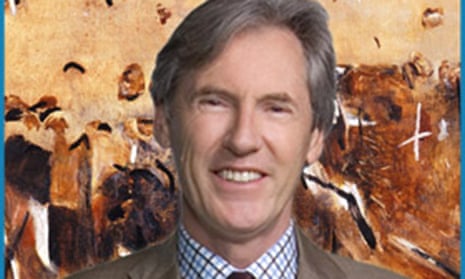The chairman of the Sydney Biennale and of its major sponsor Transfield Holdings, Luca Belgiorno-Nettis, has resigned his position with the festival.
Organisers have announced that they will cut all ties with Transfield Holdings and with Transfield Services, a contractor for Australia’s network of immigration detention centres.
“We have listened to the artists who are the heart of the Biennale and have decided to end our partnership with Transfield effective immediately,” organisers said in a statement.
“With deep regret, the board reluctantly accepted the decision of the chair to resign. We gratefully acknowledge the personal contribution of Luca as chair over the past 14 years. We also acknowledge the enormous contribution of the Belgiorno-Nettis family over 41 years.”
In a statement, Belgiorno-Nettis acknowledged the impact of a growing artists’ boycott of the Biennale on his decision to resign from the festival’s board. “With many of the participating artists now torn between loyalty to our creative director and wanting to make a stand against this government policy, the core spirit of the festival is under a dark cloud,” he said.
“There would appear to be little room for sensible dialogue, let alone deliberation. Yesterday I learnt that some international government agencies are beginning to question the decision of the Biennale’s board to stand by Transfield. Biennale staff have been verbally abused with taunts of ‘blood on your hands’. I have been personally vilified with insults, which I regard as naïve and offensive. This situation is entirely unfair – especially when directed towards our dedicated Biennale team who give so much of themselves.”
“I have tendered my resignation from the Biennale board in the hope that some blue sky may open up over this 19th Biennale of Sydney,” he said
Belgiorno-Nettis said in the statement: “I wear two hats: one as chair of the Biennale of Sydney and the other as a director of Transfield Holdings; both organisations conceived by my father and nurtured by my family over many decades. I am deeply thankful to the many friends of the Biennale, and my personal friends who have supported me and the teams throughout my tenure, especially in recent weeks.”
The organisers have been under pressure since February, when 28 artists taking part in the festival published an open letter threatening to boycott the event over its links with Transfield Holdings.
“We will not accept the mandatory detention of asylum seekers, because it is ethically indefensible and in breach of human rights; and ... as a network of artists, arts workers and a leading cultural organisation, we do not want to be associated with these practices,” they said.
Belgiorno-Nettis’s father, Franco, founded the festival in 1973. Luca Belgiorno-Nettis’s private company, Transfield Holdings, is a shareholder in the publicly-listed spinoff Transfield Services, which manages facilities at the Australian detention centre in Nauru, and last week won a billion-dollar contract to run the controversial Manus Island detention centre, site of a riot in February that claimed the life of Iranian asylum-seeker Reza Berati.
Four artists announced on Wednesday that they would boycott the event, citing its links to Transfield. Artists Agnieszka Polska, Sara van der Heide, Nicoline van Harskamp and Nathan Gray announced their decision in a statement on Wednesday. “We have requested the Biennale that our withdrawal be registered on their website and signposted at the physical site of exhibition, so that this action will not be unnoticed,” they said.
Upon hearing the news that ties with Transfield would be severed, Gray said he would “absolutely” rejoin the festival.
“I’d be proud to work for an organisation that has made such a strong stance on a human rights issue. My concern with the Biennale was purely the unethical sponsorship issue. I think the Biennale board have done a great thing and I would be proud to work with them,” he said.
Visual artist Gabrielle de Vietri, who had also withdrawn her work, said she was “extremely overwhelmed” by the success of the public campaign against Transfield’s sponsorship.
But she was more circumspect about re-entering this year’s Biennale. “This was a reaction to a political situation that’s still ongoing. And re-entering the Biennale would deny all of that mess, and that mess is still happening,” she said.
Wednesday’s announcement of further boycotts had brought the total number of artists forgoing the Biennale to nine, after five artists, including de Vietri, last week announced they had “revoked our works, cancelled our public events and relinquished our artists’ fees” for the event, scheduled to begin on 21 March.
An installer and technician on the event, Peter Nelson, had also announced his resignation on Friday morning. “The relationship between the Biennale and the punitive practice of mandatory detention is a context that I feel I am unable to work within,” he said.
Biennale organisers last week said they would consider holding a public debate on detention centres, but initially stood by Transfield and Luca Belgiorno-Nettis.
“The Biennale’s ability to effectively contribute to the cessation of bipartisan government policy is far from black and white. The only certainty is that without our founding partner, the Biennale will no longer exist,” they said.
“Consequently, we unanimously believe that our loyalty to the Belgiorno-Nettis family – and the hundreds of thousands of people who benefit from the Biennale – must override claims over which there is ambiguity.”
That remained the Biennale’s position until Belgiorno-Nettis’s decision to resign on Friday. Deputy chairman Andrew Cameron will take over his role until the Biennale appoints a replacement, after the close of this year’s festival.

Comments (…)
Sign in or create your Guardian account to join the discussion